Problem „Błąd zbyt wielu przekierowań” to błąd WordPress, który może być spowodowany przez wtyczkę lub nieprawidłowe ustawienia. W rzeczywistości jest to jeden z najczęstszych błędów widzianych przez naszych czytelników i innych użytkowników WordPressa.
Ten błąd może nawet zablokować Ci dostęp do Twojej witryny, co utrudnia jego naprawę. Na szczęście wielokrotnie rozwiązywaliśmy problem zbyt wielu przekierowań, więc wiemy dokładnie, co robić.
W tym artykule pokażemy, jak łatwo naprawić problem „Błąd zbyt wielu przekierowań” w WordPress. Omówimy również, jak odzyskać dostęp do swojej witryny i rozwiązać problem.

Co powoduje problem „Błąd zbyt wielu przekierowań” w WordPressie?
Błąd „zbyt wiele przekierowań” jest spowodowany nieprawidłowo skonfigurowanym problemem z przekierowaniem w WordPressie.
Jak być może już wiesz, WordPress ma funkcję przyjaznej dla SEO struktury adresów URL, która wykorzystuje funkcję przekierowania. Podobnie, wiele popularnych wtyczek WordPress wykorzystuje tę funkcję do ustawiania tymczasowych przekierowań, tworzenia stałych przekierowań 301 i naprawiania błędów 404.
Jeśli używasz wtyczki do naprawiania problemu z niezabezpieczoną zawartością SSL lub wtyczki do buforowania WordPress, może to również wpłynąć na przekierowania i spowodować błąd „zbyt wiele przekierowań”.
Tak wygląda komunikat „ERR_TOO_MANY_REDIRECTS” w Google Chrome.
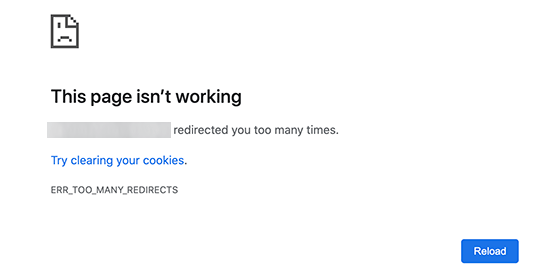
Jednak ten błąd nie mówi Ci, co powoduje konflikt i wymusza pętlę przekierowań w WordPressie.
Tak wygląda błąd w przeglądarce Firefox z komunikatem „Strona nie jest prawidłowo przekierowywana”.
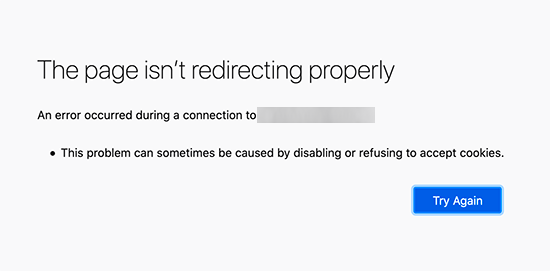
Mając to na uwadze, przyjrzyjmy się, jak naprawić błąd zbyt wielu przekierowań w WordPress.
Przeprowadzimy Cię krok po kroku przez rozwiązywanie problemów, uzyskiwanie dostępu do Twojej witryny WordPress i zapobieganie ponownemu wystąpieniu błędu.
- Wyczyść pliki cookie i pamięć podręczną przeglądarki
- Dezaktywuj wszystkie wtyczki WordPress
- Napraw adresy URL WordPress
- Resetuj plik .htaccess WordPress
- Zapobieganie błędom zbyt wielu przekierowań w WordPressie
- Samouczek wideo
1. Wyczyść pliki cookie i pamięć podręczną przeglądarki
Częstą przyczyną błędu mogą być pliki cookie Twojej przeglądarki internetowej. Spróbuj uzyskać dostęp do swojej witryny za pomocą innej przeglądarki internetowej, takiej jak Firefox, Safari, Opera lub Microsoft Edge.
Jeśli możesz normalnie uzyskać dostęp do swojej strony internetowej za pomocą innej przeglądarki, musisz wyczyścić pliki cookie i pamięć podręczną przeglądarki w swojej zwykłej przeglądarce.
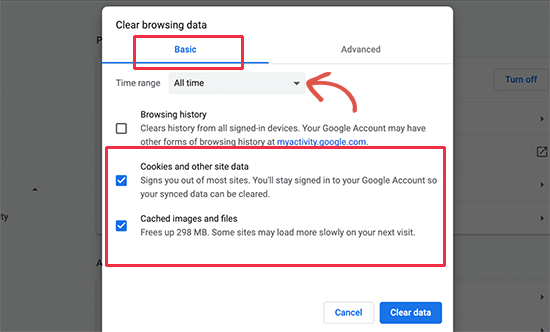
Mamy szczegółowy przewodnik na temat jak wyczyścić pamięć podręczną przeglądarki we wszystkich głównych przeglądarkach, który pomoże Ci to zrobić.
Z drugiej strony, jeśli zmiana przeglądarki nie rozwiąże problemu, możesz przejść do następnego kroku.
2. Dezaktywuj wszystkie wtyczki WordPress
Najczęstszą przyczyną pętli przekierowań w WordPressie lub błędu „ERR_TOO_MANY_REDIRECTS” jest konflikt wtyczek. Wtyczka WordPress próbująca skonfigurować przekierowanie w sposób, który koliduje z domyślnymi przekierowaniami WordPressa, może spowodować ten komunikat o błędzie.
Aby to naprawić, musisz dezaktywować wszystkie wtyczki WordPress na swojej stronie internetowej. Zazwyczaj możesz po prostu przejść do strony Wtyczki » Wszystkie wtyczki w obszarze administracyjnym WordPress i dezaktywować wtyczki stamtąd.
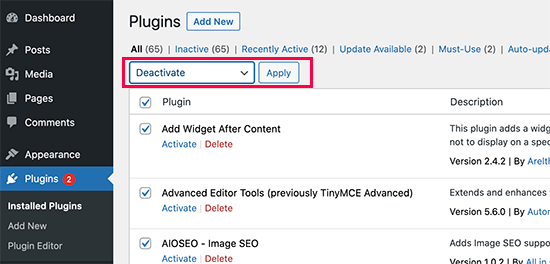
Zakładamy jednak, że z powodu błędu przekierowania możesz mieć ograniczony dostęp do obszaru administracyjnego WordPress.
W takim przypadku będziesz musiał dezaktywować wtyczki WordPress za pomocą klienta FTP, takiego jak FileZilla, lub aplikacji Menedżer plików w panelu kontrolnym hostingu WordPress.
Po prostu połącz się ze swoją stroną internetową za pomocą klienta FTP i przejdź do folderu /wp-content/.
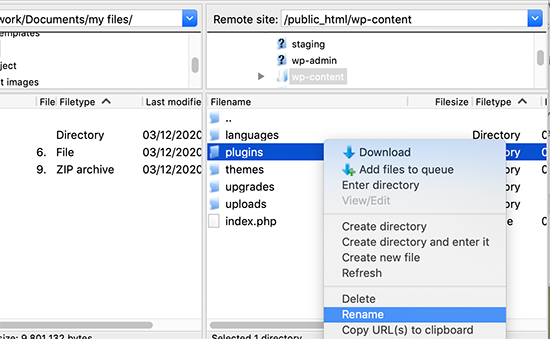
Tam znajdziesz folder plugins, który musisz zmienić nazwę na „plugins.deactivate”.
Zrobienie tego dezaktywuje wszystkie wtyczki WordPress na Twojej stronie.
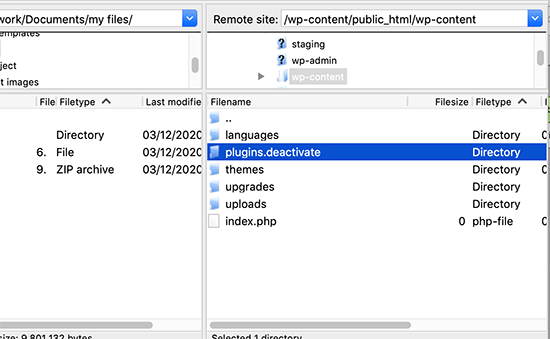
Zasadniczo WordPress szuka folderu o nazwie plugins, aby załadować pliki wtyczek. Kiedy nie znajdzie folderu, automatycznie wyłącza aktywne wtyczki w bazie danych.
Teraz możesz spróbować odwiedzić swoją stronę WordPress. Jeśli teraz możesz zalogować się do swojego panelu administracyjnego WordPress, oznacza to, że jeden z wtyczek powodował błąd.
Aby dowiedzieć się, która wtyczka była winowajcą, musisz wrócić do klienta FTP lub aplikacji Menedżer plików i zmienić nazwę folderu plugins.deactivate z powrotem na 'plugins'.
Następnie przejdź do obszaru administracyjnego WordPress swojej witryny i przejdź do strony Wtyczki » Wszystkie wtyczki. Stąd możesz aktywować swoje wtyczki jedna po drugiej, a następnie odwiedzić swoją witrynę, aby sprawdzić, czy możesz odtworzyć błąd.
Po znalezieniu wtyczki powodującej błąd, możesz znaleźć alternatywę dla tej wtyczki lub zgłosić problem na forum wsparcia WordPress dla tej wtyczki.
3. Napraw adresy URL WordPress
Inną główną przyczyną tego błędu jest błędna konfiguracja ustawień adresu URL WordPress. Zazwyczaj można wyświetlić te opcje na stronie Ustawienia » Ogólne.
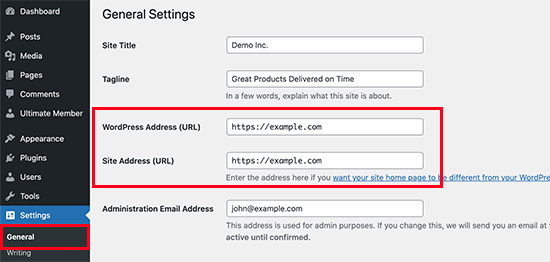
W przypadku większości stron internetowych adresy URL w polach „Adres WordPress” i „Adres witryny” muszą być takie same. Jednak niektórzy użytkownicy mogą używać „www” w jednym adresie URL i adresu bez „www” w drugim.
Ponieważ możesz nie mieć dostępu do obszaru administracyjnego WordPress, być może będziesz musiał naprawić adresy URL WordPress za pomocą klienta FTP lub aplikacji Menedżer plików.
Po prostu połącz się ze swoją witryną WordPress za pomocą klienta FTP i przejdź do /wp-content/themes/nazwa-twojego-motywu/.

Stąd musisz znaleźć plik functions.php i edytować go za pomocą prostego edytora tekstu, takiego jak Notatnik lub TextEdit.
Następnie musisz dodać następujący kod na dole:
update_option( 'siteurl', 'https://example.com' );
update_option( 'home', 'https://example.com' );
Nie zapomnij zastąpić „https://example.com” adresami URL swojej własnej witryny. Możesz teraz zapisać zmiany i przesłać plik z powrotem na swoją stronę internetową.
Po tym spróbuj odwiedzić swoją witrynę, aby sprawdzić, czy to rozwiązuje problem.
Aby uzyskać więcej metod, zapoznaj się z naszym samouczkiem na temat łatwej zmiany adresów URL WordPress.
4. Resetowanie pliku .htaccess WordPress
Plik .htaccess to specjalny plik używany przez serwer strony internetowej do zarządzania przekierowaniami i innymi ustawieniami serwera. WordPress używa również tego pliku do adresów URL przyjaznych dla SEO i innych przekierowań.
Czasami wtyczki WordPress mogą wprowadzać zmiany w pliku .htaccess Twojej witryny, co może spowodować ten błąd. Jest również możliwe, że dezaktywacja wtyczki nie usunie tych zmian z pliku .htaccess.
W takim przypadku będziesz musiał ręcznie zresetować plik .htaccess WordPress.
Ponownie, będziesz musiał uzyskać dostęp do swojej witryny za pomocą klienta FTP lub aplikacji Menedżer plików w panelu hostingowym. Po połączeniu zobaczysz plik .htaccess w głównym folderze swojej witryny.
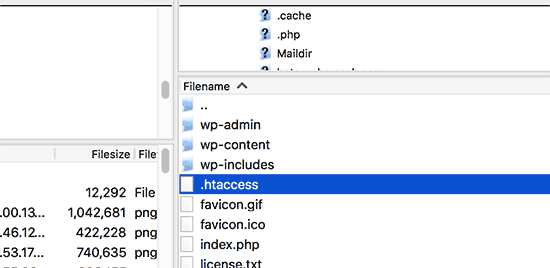
Uwaga: Jeśli nie możesz znaleźć pliku .htaccess, zapoznaj się z naszym przewodnikiem na temat jak znaleźć plik .htaccess w WordPressie.
Najpierw musisz pobrać kopię swojego pliku .htaccess na swój komputer jako kopię zapasową. Następnie możesz usunąć plik ze swojej strony internetowej.
Możesz teraz spróbować odwiedzić swojego bloga WordPress. Jeśli wszystko działa normalnie, oznacza to, że plik .htaccess powodował błąd przekierowania.
Teraz, ponieważ usunęliśmy plik .htaccess, będziesz musiał go odtworzyć. Zazwyczaj Twoja strona WordPress może zrobić to sama. Aby się upewnić, przejdź do strony Ustawienia » Permalinks i kliknij przycisk „Zapisz zmiany” na dole.
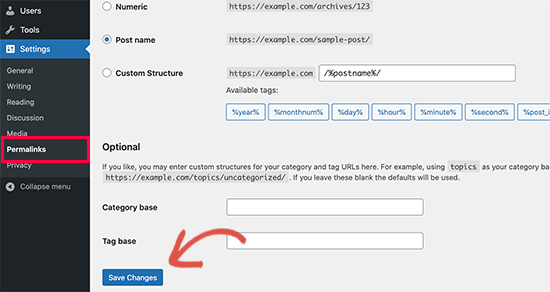
5. Zapobieganie błędom zbyt wielu przekierowań w WordPress
Mamy nadzieję, że opisane kroki rozwiązały problem przekierowań na Twojej stronie internetowej. Jeśli problem nie został rozwiązany, być może będziesz musiał skontaktować się ze swoim dostawcą hostingu WordPress, aby upewnić się, że nie ma problemu z serwerem.
Po naprawieniu problemu na Twojej stronie, powinieneś również być w stanie ustalić, co go spowodowało.
Jeśli to była wtyczka, musisz zgłosić problem na forum wsparcia wtyczki. Zobacz nasz przewodnik po tym, jak prosić o wsparcie WordPress. Jeśli jednak nie możesz uzyskać pomocy, zawsze możesz znaleźć alternatywną wtyczkę, która robi to samo.
Jeśli błąd został spowodowany błędną konfiguracją witryny WordPress, możesz to odnotować i upewnić się, że ustawienia Twojej witryny są prawidłowo skonfigurowane.
Aby uzyskać więcej wskazówek, zapoznaj się z naszym szczegółowym samouczkiem, jak samodzielnie rozwiązywać problemy z WordPress jak prawdziwy profesjonalista.
Samouczek wideo
Jeśli nie lubisz instrukcji pisemnych, możesz zamiast tego skorzystać z naszego samouczka wideo:
Mamy nadzieję, że ten artykuł pomógł Ci rozwiązać problem „błąd zbyt wielu przekierowań” na Twojej stronie internetowej. Możesz również dodać do zakładek nasz ostateczny przewodnik po najczęstszych błędach WordPress i zobaczyć jak skontaktować się z pomocą techniczną WordPress.
Jeśli podobał Ci się ten artykuł, zasubskrybuj nasz kanał YouTube po samouczki wideo WordPress. Możesz nas również znaleźć na Twitterze i Facebooku.





Akash Gadiya
Wypróbowałem wszystkie sugerowane rozwiązania, ale niestety żadne z nich nie działa dla mnie. Ostatnią rzeczą, jaką pamiętam, że zrobiłem w cPanelu, było użycie kreatora kopii zapasowych do wykonania pełnej kopii zapasowej witryny. Po tym zakładam, że zaczął pojawiać się błąd zbyt wielu przekierowań. Teraz nie mam nawet dostępu do panelu administratora. Czy to w jakikolwiek sposób może być powiązane z tym problemem?
Oto co zrobiłem do tej pory:
1) Dodałem te linie kodu do pliku wp-config.php z www i bez www
2) Usunąłem 2 pliki .htaccess, jeden w katalogu głównym i drugi w folderze wp-content, jeden po drugim
3) Zmieniłem nazwę folderu plugins, aby go zdezaktywować
4) Pobrałem plik kopii zapasowej z katalogu głównego i usunąłem go z serwera
4) Przejrzałem wszystkie komentarze w poszukiwaniu możliwego rozwiązania, ale na próżno
Będę bardzo wdzięczny za wszelką pomoc.
Dzięki!
alin
to działa świetnie dla wordpress.
wielkie dzięki!
Jason Lee
Można to naprawić, wyłączając lub włączając wtyczki w Narzędziach WordPress.
Caspian Canuck
W moim przypadku winowajcą był wtyczka przekierowań, która miała funkcję (której nie pamiętam, żebym ją włączył, więc mogła zostać wykonana automatycznie podczas aktualizacji wersji), która monitoruje zmiany w adresach URL stron i tworzy automatyczne przekierowania. Pomysł polegał na tym, że jeśli miałeś stronę, którą pierwotnie utworzyłeś w kategorii A, a następnie przeniosłeś ją do kategorii B, wtyczka automatycznie utworzyłaby przekierowanie HTTP 301 z /category_a/slug do /category_b/slug. Z wyjątkiem tego, że nie jest wystarczająco inteligentna, aby usunąć to przekierowanie, jeśli później zdecydujesz się przenieść stronę z powrotem do kategorii A i głupio utworzyłaby drugie przekierowanie z /category_b/slug do /category_a/slug. To stworzyłoby nieskończoną pętlę przekierowań.
Moim rozwiązaniem tego idiotyzmu było wyłączenie funkcji automatycznego przekierowania.
Renan
Wielkie dzięki!
Muqarrab Zaidi
Moja strona działa dobrze, nie mam z tym problemu, edytowałem plik .htaccess i kod, który podałeś, ale ten problem nadal istnieje.
Muqarrab Zaidi
Dezaktywowałem wszystkie wtyczki (nazwa folderu zmieniona w wp-content), ale nadal nie mogę zalogować się do obszaru administracyjnego. Błąd jest taki sam: ERR_TOO_MANY_REDIRECTS. Proszę o sugestię. Próbuję to rozwiązać, od 2 dni nie mogę publikować moich artykułów.
Webadmin
Dowiedziałem się, że istnieją dwa pliki .htaccess, jeden w folderze www i drugi w folderze www/wp-admin. Odkryłem również, że miałem włączone zabezpieczenia, gdzie folder administracyjny był dozwolony tylko z określonego adresu IP. Mój dostawca DSL zmienił mój zewnętrzny adres IP w pewnym momencie i zaczął powodować problemy z „przekierowaniem”. Po dodaniu nowego adresu IP do pliku www/wp-admin/.htaccess, byłem w stanie zobaczyć moją stronę logowania administratora.
Amber
Usunąłem plik .htaccess, ale nowy nie został wygenerowany. Czy muszę coś zrobić, aby wygenerować nowy plik .htaccess?
Martha
Po usunięciu pliku .htaccess musisz zalogować się do swojego obszaru administracyjnego, przejść do Ustawienia -> Linki bezpośrednie, wybrać preferowaną opcję adresu URL, a następnie kliknąć Zapisz. Nowy plik .htaccess zostanie dla Ciebie wygenerowany.
Lookman
Po wypróbowaniu wszystkich sugerowanych powyżej rozwiązań bez powodzenia. Natknąłem się na rozwiązanie: mój folder wp-admin znajdował się w folderze cgi-bin, nie wiem, jak ten folder został utworzony, skopiowałem mój folder wp-admin do głównego folderu i usunąłem folder cgi-bin.
Dzięki wszystkim
Emma
Kiedy zmienię moją domenę, zarówno w adresie WordPress, jak i w adresie strony, czy po zalogowaniu się na stronę administracyjną będzie ona z moją nową domeną?
Teraz jest to http://www.example.com/wp-admin/
kiedy to zmienię i usunę www, czy logowanie będzie takie samo, czy teraz będzie
http://example.com/wp-admin/?
Wsparcie WPBeginner
Cześć Emma,
Będzie to http://example.com/wp-admin/
Admin
hossam elbadry
Ten sam problem wystąpił u mnie z linkiem do Panelu Sterowania (wp-admin) i druga zaproponowana przez Ciebie metoda nie powiodła się u mnie.
Romas
Mam nieskończoną pętlę przekierowań, gdy zmieniam w ustawieniach->ogólne
http://example.com na https://example.com, myślę, że oznacza to, że istnieje jakieś przekierowanie z https do http, ale nie mogę go znaleźć, o ile wiem, nie mam wtyczek, które przekierowują z https do http, ale myślę, że jest to standardowa funkcja WordPress, jak mogę to wyłączyć?
Dzięki.
Wsparcie WPBeginner
Cześć Romas,
Nie, to nie jest funkcja WordPressa. Jeśli nie masz zainstalowanego SSL na swojej stronie, musisz użyć http:// zarówno w adresie strony, jak i w adresie WordPressa na stronie Ustawienia -> Ogólne.
Admin
Balamurugan
Dziękuję bardzo. Właśnie uratowałeś mi dzień.
Przez przypadek zmieniłem adres URL mojej witryny. Dzięki za pomoc
Graham
Dziękuję! Naprawiłem mój problem z przekierowaniem, wyłączając wtyczkę WordPress HTTPS!
Alex Lucchesi
Moje rozwiązanie: kiedy zauważyłem, że żadne z powyższych rozwiązań nie działa, zdałem sobie sprawę, że za każdym razem jedynym sposobem, aby pomyślnie dostać się do mojejdomeny/wp-admin, było przejście do GoDaddy cPanel, Installatron, Moje aplikacje i kliknięcie linku do mojejdomeny.com/wp-admin
Więc kliknąłem prawym przyciskiem myszy na ten link i wkleiłem go do właściwości zakładki. Kiedy to zrobiłem, ścieżka była bardzo długa i nie była oczekiwaną ścieżką mojejdomeny.com/wp-admin
GoDaddy robił o wiele więcej, aby mnie tam wprowadzić.
Po zaktualizowaniu zakładki z właściwą ścieżką mam teraz rozwiązanie jednym kliknięciem, aby dostać się do poziomu administratora.
hugo
466/5000
Mnie dzieje się to samo. Nie mogłem uzyskać dostępu do administratora, gdy dodatek Polylang był aktywny.
Użyłem metody dezaktywacji folderu polylang (wp-content / plugins / polylang) przez ftp, zmieniając jego nazwę na „polylang_backup”, aby przynajmniej wejść do panelu.
Ale potrzebuję, żeby działało z aktywowanym polylang. Mamy już dużo przetłumaczonych treści u klienta.
* Zauważyłem, że stało się to, gdy wyczyściłem pamięć podręczną
Proszę o pomoc
Tunc
Dziękuję za Twój tutorial. Niedawno przeniosłem moją stronę na https, ale zdałem sobie sprawę, że powoduje to duże obciążenie procesora serwera, więc po 3 dniach zdecydowałem się wrócić do http. Otrzymałem błąd zbyt wielu przekierowań, ale udało mi się go naprawić, postępując zgodnie z Twoim tutorialem i czyszcząc ciasteczka.
Mój problem polega na tym, że osoby, które odwiedziły wersję https mojej strony, otrzymują błędy zbyt wielu przekierowań, a niektóre nie wiedzą, że powinny wyczyścić swoje ciasteczka. Czy jest coś, co mogę zrobić po stronie serwera, aby nie otrzymywały błędów przekierowania?
Z poważaniem
Akash Negi
Witaj początkujący w WordPressie
Moja strona internetowa nie otwierała się w wersji bez www, więc wprowadziłem pewne zmiany, takie jak przekierowanie domeny na moją własną domenę (naprawdę nie wiem, co robiłem). Ale teraz mam problem. Moja strona ma błąd zbyt wielu pętli przekierowań. Proszę, pomóż mi, jak rozwiązać ten błąd. Jest to dla mnie bardzo ważne
Dzięki!
Wsparcie WPBeginner
Cześć Akash,
Najpierw musisz cofnąć zmiany, które wprowadziłeś na swojej stronie internetowej, takie jak przekierowanie domeny. Następnie musisz skontaktować się ze swoim dostawcą hostingu WordPress. Niektórzy dostawcy hostingu WordPress konfigurują swoje serwery w sposób, który pozwala na automatyczne przekierowanie użytkowników z adresu URL bez www na adres URL z www i odwrotnie. Wybierz jeden, a następnie się go trzymaj i nie zapomnij wprowadzić preferowanego adresu URL w ustawieniach WordPress.
Admin
Vinny
Uratowałeś mi dzień!!
Dzięki
Diego
Jesteś gościem!!! dziękuję bardzo za ten artykuł.. rozwiązał mój problem
Thomas F.
Miałem ten problem po zmianie ustawienia w PLESK. W "ustawieniach hostingu". Ustawilem "preferowany domenę" na zamiast i nie mogłem już dotrzeć do mojego wordpressa.
Dave 'Niyi
Jak błogosławiony i przyjemny jest dzisiejszy dzień!
Zajęło mi 51 dni, aby rozwiązać wszystkie te problemy.
Moje problemy ze stroną zaczęły się od „Błąd nawiązywania połączenia z bazą danych”.
Odwiedziłem wiele forów internetowych w poszukiwaniu pomocy, ale na próżno, dopóki nie zmieniłem hostingu.
Nowy hosting zrobił wszystko, co mógł, a potem mój panel administracyjny zaczął działać. Moja strona zaczęła kolejny błąd „Błąd wewnętrzny serwera”, który został rozwiązany po wyszukaniu rozwiązania w Google. Następnie pojawił się trzeci błąd „Zbyt wiele przekierowań”.
Przeczytałem ten post i zastosowałem wszystkie zalecane rozwiązania, również bezskutecznie. Czytałem dalej komentarze, aż natknąłem się na komentarz SARAH HAYES. Zgadnijcie co?
Jedna wielka litera, której użyłem w nazwie mojej domeny, spowodowała błąd.
Oto co zrobiłem:
Zastąpiłem mojadomenanazwa.com mojadomenanazwa.com w mojej bazie danych wordpress i w moim pliku wp-config.php i problem został natychmiast rozwiązany.
Jaka bolesna lekcja do nauki. NIGDY NIE UŻYWAJ WIELKICH LITER DLA NAZW DOMEN w ustawieniach swojej witryny i plikach.
zawsze używaj małych liter przez cały czas.
Dziękuję wszystkim za udostępnianie.
mamun
Podłączyłem się po raz ostatni. Przeczytałem ten artykuł i odłączyłem. Mój problem został rozwiązany. Dziękuję za artykuł.
Sarah
I haven’t been able to access Network Admin after installing Multisite with localhost. Since I don’t yet have a site URL, is adding the below lines to my wp-config.php file even a possible solution? What would I put in place of the URL? Any insight into this would be much appreciated.
define(‘WP_HOME’,’http://example.com’); define(‘WP_SITEURL’,’http://example.com’);
El
Usunąłem plik .htaccess i wszystko działało dobrze.
Maoz
Hej, najwyraźniej wtyczka wooCommerce spowodowała ten problem i ją zdezaktywowałem... ale potrzebuję wtyczki do mojego sklepu... jakieś sugestie?
Wsparcie WPBeginner
WooCommerce nie powinno powodować problemu. Spróbuj dowiedzieć się, dlaczego WooCommerce powoduje problem na Twojej stronie. Jeśli naprawdę chcesz użyć innej wtyczki, sprawdź naszą listę 5 najlepszych wtyczek eCommerce WordPress.
Admin
Nathan
Mam ten sam problem.
Odinstalowałem Woocommerce, a następnie ponownie go aktywowałem i za każdym razem otrzymuję komunikat o błędzie.
Musab Kara
spróbuj zmienić permalink
sadiq ali
bardzo dziękuję, działa.
Sines
Cześć,
Chcę podzielić się moim rozwiązaniem. Miałem ten sam problem i szukałem przez cały dzień, aby to naprawić. Próbowałem wszystkich powyższych rozwiązań, ale nic nie działało dla mnie. Dla mnie miało to coś wspólnego z moim hostingodawcą.
Po dezaktywacji mojego certyfikatu SSL wszystko działało ponownie. Więc zagłębiłem się i znalazłem powód. Certyfikacja SSL dotyczyła mojej domeny bez „www”. Po ponownym aktywowaniu SSL i zmianie tych linii w pliku wp-config, wszystko działało ponownie:
OD
define(‘WP_HOME’,’https://www.example.com’);
define(‘WP_SITEURL’,’https://www.example.com’);
DO (bez www)
define(‘WP_HOME’,’https://example.com’);
define(‘WP_SITEURL’,’https://example.com’);
Mam nadzieję, że mogłem pomóc komuś z tym samym problemem.
Dzięki za ten artykuł, naprowadził mnie na właściwy trop.
Oliver Gehrmann
You, good sir, are a lifesaver! Thank you very much!
Ray Fadly Franata
Gdzie mam umieścić te dwie linie w pliku config.php?
nitin verma
Hej, od wczoraj mam błąd przekierowania. Czy możesz mi pomóc? Właściwie, kiedy szukam w wyszukiwarce Google, pojawia się ten błąd. Próbowałem kroków, o których wspomniałem powyżej, ale to mi nie działa.
Możesz też wyszukać "punjab police physical details", nie otworzy się za pierwszym razem, a po odświeżeniu otworzy się.
Czy możesz mi pomóc.
Armie
Sprawdź .htaccess
Tak rozwiązałem swój problem.
Mam nadzieję, że to pomoże.
Byamugisha Phillimon
na której linii powinienem dodać
define(‘WP_HOME’,’http://example.com’);
define(‘WP_SITEURL’,’http://example.com’); używam edytora Atom.
Wsparcie WPBeginner
Tuż przed następującą linią:
/* To wszystko, przestań edytować! Miłego blogowania. */
Admin
Byamugisha Phillimon
Taki komunikat wyświetla się w mojej przeglądarce: Parse error: syntax error, unexpected ‘:’ in /hermes/bosnaweb10a/b2702/ipg.villsmed/public_html/kob/Freestyle/wp-config.php on line 83. Dziękuję za współpracę.
Wsparcie WPBeginner
Błąd oznacza, że w kodzie pliku wp-config.php na linii 83 znajduje się dodatkowy dwukropek :. Musisz edytować ten plik za pomocą klienta FTP i przejść do linii 83. Kod w tej linii zawiera błędnie umieszczony lub niechciany dwukropek.
Fiona
Thank you so much – I’m glad i found this. I was able to fix the error after being on hold on support for 2 hours with my host who had no idea!! Kudos to you.
Kudos to you.
Vinita
Cześć,
Czy możesz mi pomóc z tym problemem przekierowania?
Mój adres strony to example.com/some-page.php, a adres WordPress to example.com/some-page/
Teraz Google widzi obie jako różne strony. Chcę więc przekierować some-page.php do /some-page/
Jak mam to zrobić?
Użyłem przekierowania 301, ale pojawia się błąd pętli przekierowania.
Każda pomoc będzie bardzo ceniona.
Wsparcie WPBeginner
Połącz się ze swoją stroną internetową za pomocą klienta FTP. Zlokalizuj plik .php i pobierz go na swój komputer jako kopię zapasową. Gdy już będziesz go mieć na swoim komputerze, możesz go bezpiecznie usunąć z serwera. Twoje przekierowania powinny teraz działać poprawnie.
Admin
musthafa
Ja też miałem podobny problem „przekierowano zbyt wiele razy” we wszystkich przeglądarkach internetowych. Problem wynikał z „WC Vendors”. Dezaktywowałem ten wtyczkę, a potem moja witryna działa idealnie. Więc dezaktywuj „WC Vendors”, wszystko będzie dobrze..
Sarah Hayes
Miałem ten problem i zrobiłem wszystko, co zostało wymienione powyżej, a nadal miałem problemy z przekierowaniem. Problemem było użycie wielkich liter.
Sheila
Czy ktoś miał problem podczas lokalnego rozwoju? Ostatnio aktualizowałem wtyczki, ale przeniesienie wszystkich folderów wtyczek do kosza nie pomogło. Mam dostęp do bazy danych: Jeśli dodam sugerowany język do pliku wp-config.php, wp-options pokazuje "krytyczny błąd Javascript". Dalsze sugestie? Pomysł z www nie ma znaczenia na localhost (używam adresu #s, a nie localhost: język)
Daniel Lofaso
Dzięki za post. Witryna mojego klienta miała ten problem i był on spowodowany przez wtyczkę o nazwie „Verve SSL”, która zmienia ustawienia adresów URL https i http. Dezaktywowałem ją i nie otrzymałem już tego błędu. Teraz będziemy musieli współpracować z naszym hostingiem, aby dalej rozwiązywać problemy, ponieważ nie wiem, czy jest to wymagana wtyczka dla strony HTTPS mojego klienta.
Matthew
Dziękuję. Szukałem godzinami, żeby dowiedzieć się, dlaczego ładne linki nie działały i moja strona się zawiesiła.
Prosta poprawka
define(‘WP_HOME’,’http://example.com’);
define(‘WP_SITEURL’,’http://example.com’);
Manos
Cześć Matthew
To wydaje się bardzo sprytne rozwiązanie – dziękuję za podzielenie się nim.
Jednak dla nas, lądowych szczurów – czy byłbyś tak miły i dodał tylko kilka linijek wyjaśniających, co dokładnie zrobiłeś i co rozwiązało problem??
Wielkie dzięki
Juan Torrijos
Witajcie wszyscy, miałem ten sam problem (zbyt wiele przekierowań) i chciałem podzielić się moim rozwiązaniem.
Mam intranet z niestandardowym motywem.
Problem zaczął się, gdy zmieniłem szablon strony głównej w Ustawieniach czytania, z „Twoje najnowsze posty” na „Strona statyczna”. Przełączyłem z powrotem na „Najnowsze posty” i zadziałało.
I didn’t notice it right away because I was logged in all the time. I only saw it when I tried to log back in. But I had made so many changes that I didn’t know what was the problem right away, leading me to this great post!
Laura Paulus
Próbowałem naprawić moją stronę przez kilka dni i nic nie działało! Właśnie przeczytałem Twój komentarz i spróbowałem. BAM! Działa! Dziękuję bardzo za opublikowanie tego!!!
Juan Torrijos
Cześć Laura, cieszę się, że pomogło.
Okazało się, że używałem funkcji wp_redirect( home_url() ) w moim index.php, która generowała home_url(), więc przekierowywała z powrotem na tę samą stronę, co powodowało nieskończoną pętlę przekierowań.
Skończyłem usuwając tę linię kodu z index.php i używając strony statycznej jako strony głównej. Jeśli użytkownik nie jest zalogowany, zamiast przekierowywać, po prostu wyświetla formularz logowania.
Dave
Juan, świetnie to zrobiłeś! U mnie zadziałało. Dzięki!
Juan Torrijos
Cześć Dave, cieszę się, że zadziałało. Czy usunąłeś funkcję wp_redirect() z pliku index.php, czy zmieniłeś wyświetlanie strony głównej w ustawieniach?
Geordie
Cześć, miałem problem z przekierowaniem w Chrome po zmianie ustawienia w moim niestandardowym permalinku. Usunięcie pliku .htaccess w celu jego ponownego wygenerowania przez serwer rozwiązało problem. Dziękuję.
Martin
Cześć wszystkim,
Niedawno zainstalowałem WordPressa i motyw Travelo – Travel and Booking Theme. Wszystko działało płynnie od początku. Następnie na moim ekranie pojawił się problem zbyt wielu przekierowań. Mam dostęp do mojego panelu administracyjnego WordPressa. Wszystko jest dobrze ustawione (adres strony, adres WordPressa), moje linki stałe są ustawione na Dzień i nazwa. Dezaktywowałem wszystkie wtyczki, usunąłem plik .htaccess, skontaktowałem się z moim dostawcą hostingu (byli mili i próbowali mi pomóc) i okazało się, że motyw Travelo powoduje problem. Za każdym razem, gdy aktywuję Travelo, pojawia się problem. Kiedy zmieniam motyw, wszystko jest w idealnym stanie. Skontaktowałem się z pomocą techniczną Soap Theme i czekam na ich rozwiązanie. Jeśli macie pomysł, jak to naprawić, dajcie mi znać. Dzięki.
33qamar
Cześć @Martin!
Miałem ten sam problem, próbowałem wielu rozwiązań, ale po wielu próbach dowiedziałem się, że niektóre pliki .php moich motywów (z Woocommerce) były nieaktualne. po zaktualizowaniu wszystko wróciło do normy. Teraz działa dobrze.
Dipesh
Ja też mam ten sam problem. Ale w końcu rozwiązałem go, spędzając cały dzień hahah. Przeniosłem folder wp-admin do wp-content, więc krążyłem wokół problemu cały dzień... hahah...
Glenn
Right! A missing wp-admin folder results in the same symptoms. I apparently accidentally deleted my localhost wp-admin folder. Discovered the folder was missing when I went to restore from backup.
33qamar
Cześć!
Ja też mam ten problem i jako stały czytelnik tego bloga wchodzę na niego i docieram do tego wpisu, zrobiłem wszystko, ale nadal jest.
Użyłem wtyczki migracyjnej "duplicator" do migracji strony z localhost na mój hosting.
Strona nie działa, przekierowała Cię zbyt wiele razy.
Spróbuj:
Odświeżyć stronę
Wyczyścić pliki cookie
ERR_TOO_MANY_REDIRECTS
ChrisSnipe
Mam dokładnie ten sam problem, czy znalazłeś rozwiązanie 33qamar?
Kyle
Miałem ten sam problem po migracji strony do nowego dostawcy hostingu. Czy ktoś może nam pomóc? Otrzymujemy komunikat "zbyt wiele przekierowań" z nowo zmigrowanej strony.
e-colori
Dziękuję!
tylko dodanie do wp-config.com
define(‘WP_HOME’,’http://example.com’);
define(‘WP_SITEURL’,’http://example.com’);
Naprawione! Wreszcie po wielu próbach!!!
ewan yates
Perfect! Turns out my site url was changed by a careless tech support guy. I managed to find and correct the error and now my site is back up and running
Jason
Zastanawiam się, czy ktoś inny spotkał się z problemem przekierowania związanym z używaniem wtyczki Rename wp-login.php. Lubię używać tej wtyczki do zmiany domyślnego adresu wp-admin. Używałem jej wraz z funkcją, która dodaje określony ciąg znaków na końcu adresu URL logowania (np. ?jedi=theforce). Ta dodatkowa funkcja wykorzystuje kilka przekierowań. Funkcja określa tylko, że jeśli ciąg znaków jest brakujący lub nieprawidłowy, przekieruj do Google. Myślę, że to spowodowało zbyt wiele przekierowań na jednej z moich stron. Jeśli ktoś ma możliwe rozwiązanie, proszę dajcie znać.
Dzięki!
kulbir singh
i druga rzecz jest taka,,,,kiedy otworzę to następnym razem na tym samym komputerze, to nie przekieruje na żadną stronę,,,,jeśli chcesz zobaczyć ten problem następnym razem na tym samym komputerze, wyczyść pliki cookie z tego samego komputera i jeśli spróbujesz ponownie otworzyć moją stronę, pojawi się ten sam problem
główna uwaga to to
jeśli pliki cookie są już przechowywane na komputerze mojej strony internetowej,,, to ten problem się nie pojawia
jeśli wyczyszczę pliki cookie z mojego komputera,,, to ten problem pojawia się ponownie
ViralKida
define(‘WP_HOME’,’http://example.com’); define(‘WP_SITEURL’,’http://example.com’);
będzie działać dobrze… Dzięki….. ADMIN
Angie
O mój Boże, jesteś najlepszy. Nie mogłem nigdzie indziej znaleźć tego rozwiązania!!!
Marie
Dziękuję cholernie dużo! Szukałem wczoraj i szukałem. Dziś rano po godzinach wyczerpania próbując to rozgryźć wczoraj. Znalazłem dziś rano Twój film na tej stronie!
Bardzo to doceniam!
Jeszcze raz dziękuję!